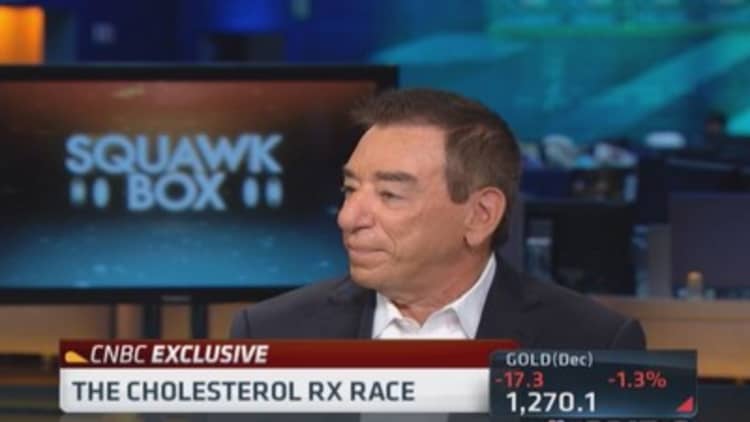
The showdown over a highly anticipated new class of cholesterol drugs is coming to a head this year, when the Food and Drug Administration is expected to approve therapies from Regeneron, Sanofi and Amgen in a market estimated at up to $10 billion.
Known as PCSK9 inhibitors, the medicines have been shown to lower LDL, or "bad" cholesterol, by as much as 72 percent. Data from Regeneron and partner Sanofi have also indicated those reductions may translate into improved cardiovascular outcomes, such as a decline in heart attacks and other effects of high cholesterol.
This weekend at the American College of Cardiology conference in San Diego, Amgen will present some of its outcomes data as well, further heating up the race and shedding more light on the class in general.
Read MoreGSK's big bet: Tapping our body's electronics
"By the end of the next decade there are probably 25 million people every year who will die from cardiovascular disease," Regeneron Chief Executive Len Schleifer said in September on CNBC's "Squawk Box." "It's really a big problem. And while statins have done a great job at lowering the risk of dying from cardiovascular disease, we find that many people just can't get to their goal, and still have a very high risk."
Statins include drugs like Pfizer's Lipitor, once the highest-selling drug in the world before it lost patent protection. Unlike statins, the PCSK9 medicines are given by injection.
The FDA is expected to decide whether to approve Regeneron's drug in July, and on Amgen's drug in August. The debate most recently has turned to the price of the therapies, as pharmacy benefits managers Express Scripts and CVS Health increasingly look to pit competing drugs against one another to lower costs.
Read MoreWhat!?! Specialty drug spending jumps 31%
CVS has estimated PCSK9 drugs could cost the U.S. health-care system $150 billion a year, while Express Scripts pegs the market at $100 billion annually. The drug industry argues those numbers are much too high. Michael Yee, an analyst with RBC Capital Markets, says each drug could draw $5 billion annually worldwide.
Lung drug competition
Analysts also point to Actelion as a stock to watch out of the conference. The Swiss drug company plans to present more data on its drug selexipag for pulmonary arterial hypertension, a fatal condition characterized by narrowing of the arteries connecting the heart and lungs.

A late-stage study showed positive initial results in June, a reduction of the risk of death or worsening effects of the disease by 39 percent for those taking the drug, compared with placebo. The data drove Actelion's stock up 15 percent, and this deeper look will have implications both for Actelion and competitor United Therapeutics, according to Cowen analyst Phil Nadeau. United Therapeutics' Remodulin is already on the market for PAH and is given by injection, while Actelion's medicine can be taken orally.
Read MoreFighting mosquitoes with more mosquitoes
Actelion filed for approval of the drug in the U.S. in December, and said earlier this month the application had been accepted.
Ahead of the ACC meeting, Credit Suisse analyst Ravi Mehrotra raised his estimate for peak annual sales of selexipag, also known as Uptravi, to 1 billion Swiss francs ($995 million) from 850 million francs.

